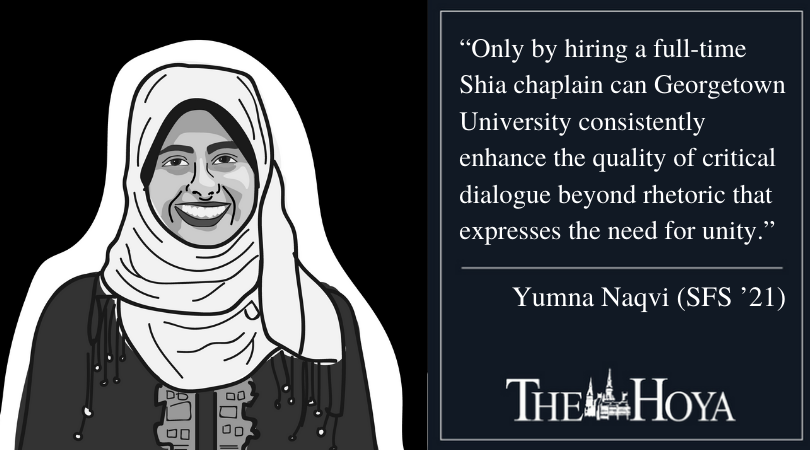Any international relations class will stress that sectarian violence plagues the lives of many Muslims around the world. Now, Georgetown University’s Muslim leadership has an opportunity to facilitate much-needed engagement within its own community.
Last month, campus ministry opened applications for a second full-time Muslim chaplain. To increase awareness of sectarian tensions and strengthen intrafaith unity, the university should hire a Shia to fill this position.
Georgetown became the first American university to hire a full-time Muslim chaplain when it appointed Imam Yahya Hendi in 1999. However, a growing Muslim student population across both main campus and the Georgetown University Law Center has stretched Hendi thin, hindering student access to their main religious resource on campus and decreasing the quality of faith programming. For the past few years, the weekly Friday prayer has frequently been led by guest speakers — who don’t understand the dynamic of the community — and appointments with Imam Hendi are often canceled or delayed due to his travels between the two campuses.
The university is making the right move by hiring an additional chaplain to support Muslim Life. However, campus ministry should recognize the dire need for the Shia religious perspective on campus when making its decision.
Though there are few Shia students that attend Georgetown, using these numbers as an excuse to ignore the necessity of a Shia chaplain would be a mistake. Sectarian violence is a reality of the modern world; Iraq and Syria, for example, devolved into chaos partially as a result of the Sunni-Shia split, and terrorist groups have risen to power by capitalizing on these divides. Among the substantial list, Somalia, Pakistan, Yemen and Bahrain have also witnessed clashes along sectarian lines.
As an institution that trains the world’s future leaders, Georgetown should be making every effort to educate its students on these tensions and how they should be navigated. A Shia chaplain would provide deeper theological insights and serve as a reliable resource on campus, rather than an international relations professor clicking through a few slides.
A Shia chaplain could also strengthen tolerance and understanding within the Muslim community by serving as a faith leader for Shia students and providing scholarship to Sunni students who seek to understand the similarities and differences between the two sects.
Though there is no outright hostility between Sunnis and Shias on campus, underlying tensions exist beneath the veneer of unity; after nearly every event that represents the Shia perspective, I have witnessed backlash ensue from certain students.
Moreover, the current lack of a Shia chaplain has resulted in Sunni-Shia intrafaith programming that is minimal and superficial. The only intrafaith dialogue occurs at the beginning of the year, and even that has historically fallen flat, failing to inspire meaningful, long-lasting engagement as a result of limited understanding and the one-time nature of the event.
Though Hendi does have knowledge on both the Sunni and Shia religious traditions, his knowledge of Shiism still has some gaps. Moreover, Hendi should not be responsible for representing both sects; asking him to do so is akin to requiring the Catholic chaplaincy to represent Protestant views.
Only by hiring a full-time Shia chaplain can Georgetown consistently enhance the quality of critical dialogue beyond rhetoric that expresses the need for unity. True unity demands candid and difficult conversations that challenges preconceived notions, not simply lip service to inclusivity.
The failure of Georgetown’s Muslim chaplaincy to provide adequate programming has cornered Shia students into othering themselves in an effort to educate their peers and facilitate intrafaith understanding.
In fact, the sparse intrafaith and Shia programming that exist have largely been proposed and organized by Shia students. While these events have largely been beneficial for the community, planning them is exhausting and difficult to balance with schoolwork.
Shia students should not be tasked with organizing events themselves to ensure integral discussions are occurring in the community. A Shia chaplain is necessary to reduce the burden of planning and maintain the sustainability of intrafaith programs.
Additionally, the student-led aspect of these events can stifle genuine engagement. Having a friend or peer moderate a discussion could prevent a Sunni student from asking a controversial question at the event for fear of alienating their peer from the community. A chaplain, however, is an institutional resource who is free from that dynamic and can encourage sensitive questions.
While Georgetown has failed to recognize the importance of the Shia perspective on campus, New York University has not made the same mistake: NYU became the first American university to establish a Shia chaplaincy in 2005.
Georgetown made strides when it first hired Hendi; now, the university should extend the Muslim leadership to better represent a diversifying community and to strengthen understanding.
Though there have been calls for the university to hire a woman for the position, the campus ministry hiring committee should prioritize a Shia resource, regardless of gender. Georgetown hired a female Muslim residential chaplain last spring, but there is no Shia resource on campus. Though this community would benefit from additional Muslim female representation, given Muslim Life’s limited funding to hire additional chaplains, the hiring committe should not dismiss a male Shia candidate.
Georgetown now faces a choice to bridge sectarian divides or remain indifferent toward reality. The university should make the responsible choice.
Yumna Naqvi is a junior in the School of Foreign Service. Sacred Space runs online every other Thursday.














